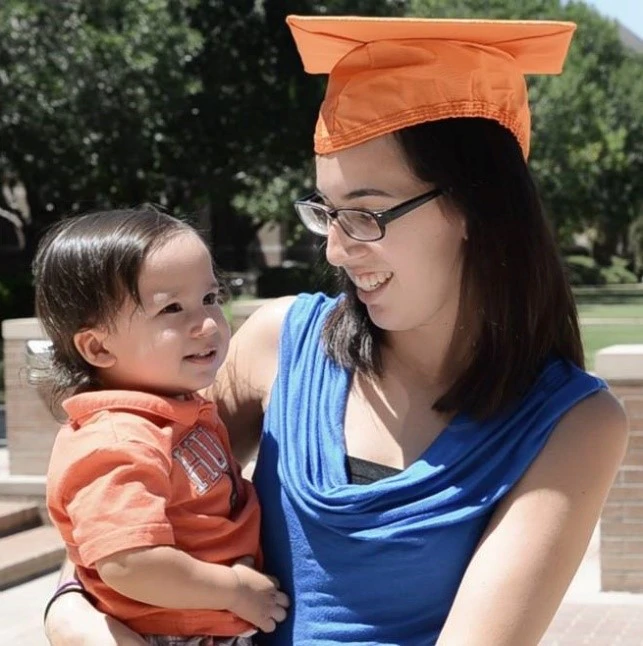Published 2019
Starting Out Right for Teen Parents
 “I’m extremely grateful for SORTP and everything they’ve done and continue to do. There was time when I really didn’t know how I was going to deal with the life changes but with the knowledge I got from the classes and support from everyone it made the transition much easier. And being able to get things I need for the baby was such a help. I’ll always be grateful.”
“I’m extremely grateful for SORTP and everything they’ve done and continue to do. There was time when I really didn’t know how I was going to deal with the life changes but with the knowledge I got from the classes and support from everyone it made the transition much easier. And being able to get things I need for the baby was such a help. I’ll always be grateful.”
- SORTP program participant
Program Description
The Starting Out Right for Teen Parents (SORTP) program provides expectant and parenting youth with an innovative combination of pre- and post-natal supports—including case management, pregnancy and parenting education classes, home visits, and a companion mobile app—to increase their protective factors and reduce the risk of rapid repeat pregnancy. Arizona Youth Partnership plans to refine the SORTP model and conduct a formative evaluation of the program.
Program Snapshot
- Population: Low-income expectant and parenting teens (ages 14-19)
- Location(s): Maricopa and Pima Counties, AZ
- Partners: El Rio Community Health Center, Adelante Healthcare, and Wesley Community & Health Center
Goals
- Increase participants’ protective factors and reduce participants’ risk factors for rapid repeat pregnancy
- Provide participants with a high level of support during the first six months after childbirth
- Integrate case management and pregnancy education services into the medical home model
- Use digital technology to increase participants’ access to health education
Strategies
Case management
Starting during pregnancy, participants meet with case managers once or twice a month to discuss their needs, set goals, and receive referrals to resources and services, including housing, education, and employment. Case managers also ensure that participants have the material supports they need to care for their babies, such as diapers, clothing, and cribs. Consistent with the patient-centered medical home model of comprehensive care, participants meet with case managers at the same community health centers where they receive primary care, dental care, and other health services.
Pregnancy and parenting education classes
Prior to delivery, participants attend 18 hours of pregnancy and parenting education classes. Through lectures, videos, roleplays, and other interactive activities, participants learn about nutrition, healthy relationships, parenting newborns, and what to expect during pregnancy, labor, and delivery. Participants are encouraged to attend classes with a support person who will be with them during labor, such as a co-parent, friend, or family member. Classes take place at the community health centers and are taught by participants’ case managers, who have been trained and certified to teach the curriculum.
Home visits
Participants receive two home visits from their case managers: one in the first week after giving birth, and another at the end of program participation, six or seven months later. During the first visit, case managers assess delivery recovery and family health, provide case management and connections to resources, and train participants in the use of SORTP’s companion mobile app. During the second visit, participants review the goals they set when they enrolled in the program, set new goals if appropriate, and receive connections to other services offered by Arizona Youth Partnership, such as parenting classes and healthy relationships education.
Companion mobile app
Participants receive additional health education after delivery by completing eight interactive virtual learning modules through SORTP’s companion mobile app. Each module contains information, videos, and questions on topics such as adolescent development, abstinence and birth control, sexually transmitted diseases and HIV/AIDS, and domestic violence. After completing each module, participants meet with their case manager through video chat to review the module’s content and address any remaining questions.
Stats at a Glance
- 21.1 Maricopa County teen birth rate (per 1,000 females ages 15-19) in 20171
- 19.1 Pima County teen birth rate (per 1,000 females ages 15-19) in 20171
- 18.8 National teen birth rate (per 1,000 females ages 15-19) in 20172
Grantee Information
Laura Pedersen
Chief Initiatives Officer
520-719-2014
LauraP@azyp.org
http://www.azyp.org/
Print the full success story here.
About the TPP Program
The Office of Population Affairs Teen Pregnancy Prevention (TPP) program is a federal grant program that funds diverse organizations working to prevent teen pregnancy across the United States. OPA invests in both the implementation of evidence-based programs and the development and evaluation of new and innovative approaches to prevent teen pregnancy. The OPA TPP program reaches adolescents ages 10-19, with a focus on populations with the greatest need in order to reduce disparities in teen pregnancy and birth rates.
Footnotes
1 Kemp, M.L., Huang, Y., & Torres, C. (2019). Teenage Pregnancy, Arizona, 2007-2017. Phoenix, AZ: Arizona Department of Health Services, Bureau of Public Health Statistics, Population Health and Vital Statistics Section. https://pub.azdhs.gov/health-stats/report/tp/2017/teenpregnancy2017.pdf. back to top
2 Martin, J.A., Hamilton, B.E., Osterman, M.J., Driscoll, A.K., & Drake, M.S. (2018). Births: Final data for 2017. National Vital Statistics Report, 67(8). Hyattsville, MD: National Center for Health Statistics. https://www.cdc.gov/nchs/data/nvsr/nvsr67/nvsr67_08-508.pdf. back to top
 An official website of the United States government
An official website of the United States government
